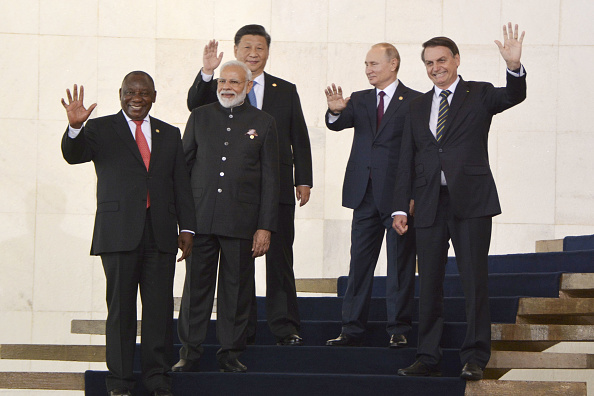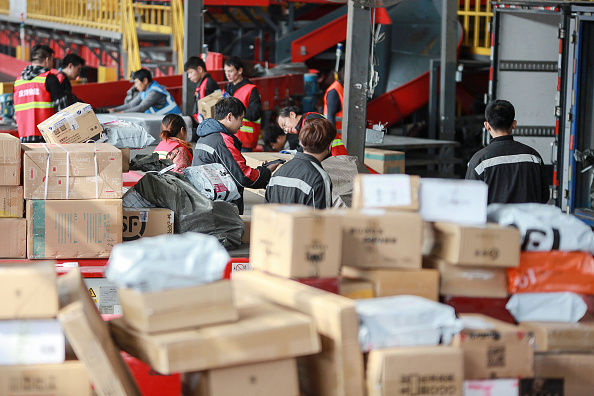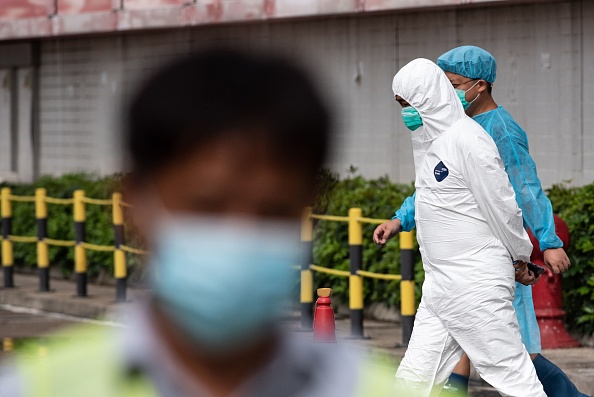
 Counterweight Critique
Counterweight CritiqueThe five BRICS nations - Brazil, Russia, India, China and South Africa - convened this week in Brazil to discuss ways the emerging market bloc could work to strengthen investment growth in a slowing global economy, among other issues. The BRICS countries represent about 42% of the global population, 23% of GDP, 30% of territory, and 18% of global trade, and are setting themselves up as a counterweight to the developed world.
In public statements, the five world leaders did not refer to the United States by name, but nonetheless were highly critical of growing protectionism, saying that it was placing downward pressure on the global economy. President Xi Jinping of China said that "bullying" tactics have eroded international trade and investment, while President Putin claimed the BRICS countries were supporting economic growth. The leaders also committed to ending unfair trade competition and unilateral sanctions between the five nations.
All eyes were on Brazilian President Jair Bolsonaro, after his repeated bashing of Chinese trade practices on the campaign trail last year brought the Brazil-China relationship to a crisis-level, according to China-US Focus contributor Jame Charter. However, the rapport this week has been more conciliatory, with multiple high-level meetings and friendly gestures between Bolsonoro and Xi. Brazil expressed interest in having China finance some of the country's infrastructure projects, while Brazillian pork exports to China are expected to increase significantly. With both countries facing economic slowdowns at home, this newfound friendship seems to be serving both their interests.
 Retail Bonanza
Retail BonanzaThe trade war may be pushing the United States away from China, but American brands were more than willing to sell to Chinese consumers during the world's biggest online shopping day. This year, Single's Day (11/11) generated nearly $38.3 billion in Chinese sales, dwarfing the $7.9 billion in online sales for the United States' Cyber Monday. Named for the four "ones" that appear in the date, Single's Day was invented by Chinese e-commerce company Alibaba and has since redefined e-commerce. American pop star Taylor Swift performed during the countdown leading up to the date, a reflection of the sales powerhouse that the annual shopping frenzy has become.
 Return of the Black Death?
Return of the Black Death?Two people have been diagnosed with the pneumonic plague in Beijing, marking the second time the disease has been detected in northern China in recent years. The plague has a lethal reputation for causing around 50 million deaths in Europe in the Middle Ages, and between 2010 and 2015, more than 3,248 cases were reported worldwide, including 584 deaths, according to the WHO. Medical experts say the chances of the disease spreading is minimal, although there is currently no vaccine to protect humans from the plague. Chinese health authorities have assured the public that preventive medicines have been administered and not to worry about contracting the disease.
Some citizens complained that the health authorities didn't act fast enough in informing the public, while others are worried if China's medical facilities are equipped to handle a health crisis of this level. China's capacity to manage public health emergencies has varied in the past. In 2002, Chinese authorities took 5 months to publicly acknowledge a deadly outbreak of severe acute respiratory syndrome, known as SARS, that ultimately killed over 300 people. But since then, China has been taking steps to increase efficiency during health crises, according to Robert Webster, virologist based at St. Jude Children's Research Hospital. Following the H7N9 outbreak in 2013, China did "exactly what should have been done. You need to get the word out as fast as possible, with transparency and urgency, so the world can respond."
Prepared by China-US Focus editorial teams in Hong Kong and New York, this weekly newsletter offers you snap shots of latest trends and developments emerging from China every week, while adding a dose of historical perspective.
- 2019-11-08 "I haven't agreed to anything"
- 2019-11-01 Don’t Hold Your Breath
- 2019-10-25 Weaponizing Diplomacy
- 2019-10-18 Economic Shudders
- 2019-10-11 A “Big Day of Negotiations”
- 2019-10-04 Birthday Celebrations
- 2019-09-28 A World Split in Two?
- 2019-09-20 Another Round
- 2019-09-13 Olive Branch or Olive Twig?
- 2019-09-07 The Unwinnable War?
- 2019-08-31 “Sorry, it’s the way I negotiate”
- 2019-08-23 Tit for Tat
- 2019-08-17 Slowdown Ahead?
- 2019-08-09 Yuan on the Rocks
- 2019-08-02 Ratcheting Up the Crisis
- 2019-07-26 Playing Defense
- 2019-07-19 “Stain of the Century”
- 2019-07-12 Whichever Way the Wind Blows
- 2019-07-04 A Gentlemen’s Agreement
- 2019-06-28 A Truce on the Horizon?